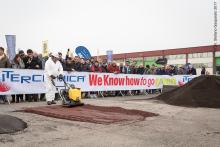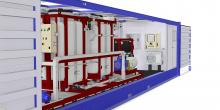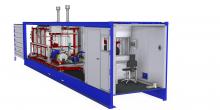The creation of a new mix design, incorporating
Charleston County has 380 rural dirt roads which require ongoing maintenance. The authority needs to pave them to reduce its maintenance bills, but there are challenges, according to Matthew Fountain, engineering manager for Charleston County Public Works: “Traditional paving methods are not economically feasible,” he said. “New regulations make the permitting process cumbersome and working the drainage system around protected trees and driveways can be bothersome for residents, not to mention the expense. We need something that is economical, constructible, and sustainable.”
The solution is pervious, or porous paving: open-graded friction course asphalt with 20% air voids which allows water to drain through so that costly drainage systems are not needed. Though this solution has been around for a long time, the mix containing Evotherm offers a more cost-effective option.
Road builder Sanders Brothers Construction, based locally, as is MWV Specialty Chemicals, carried out laboratory trials to create a totally new mix. Starting with the South Carolina DoT’s open graded friction course mix design, they replaced #7 stone which is more expensive as it has to be trucked in from 160km away, with locally available #67 stone.
With the addition of Evotherm warm mix technology, fibres and lime were removed and the PG 76-22 bitumen replaced with a PG 64-22 one. The pavement structure consists of: the existing dirt subgrade; Class 1 non-woven geotextile filter fabric; 152mm of #57 stone; 51mm of #789 stone, and 51mm of porous asphalt.
Production temperatures at the asphalt plant were lowered, reducing energy used at the plant as well as pollutants produced. According to MWV, manufacturing at lower temperatures also extends pavement life, because high temperatures can burn off the light end fractions leading to less flexibility and premature ageing.
The other benefit of using a warm mix is that it cools at a lower rate than hot mix. The stretch of road in Adams Run was 50 minutes away from Sanders Brothers’ asphalt plant in North Carolina.
Having successfully developed the new porous mix and seen it work in practice, Charleston County will be looking to use it again: “We know this is a learning process,” said Eric Adams, the county’s project manager in its Transportation Sales Tax Program. “We improved the constructability and reduced the costs, which were our short-term goals. For right now it’s looking great and we’ll monitor the completed work while looking to competitively bid upcoming projects.”
With the prospect of savings on tax-payer’s money, MWV hopes that other municipalities will also follow Charleston’s lead.
Iterchimica
Bitumen additive specialist“There are lots of benefits for the contractor over traditional cold asphalt,” said Iterchimica’s technical and laboratory manager Loretta Venturini.
Traditionally cold asphalt for pavement repair is produced using virgin aggregate, virgin binder and flux oil, and is made at a higher temperature and then allowed to cool. By using Iterlene ACF 1000 HP Green, all RAP can be used, saving resources; mixing temperatures are lower which saves energy; and the asphalt mix is workable for a longer period of time which reduces waste.
“For the contractor, this means that they are saving cost,” said Venturini.
Iterlene ACF 1000 HP Green is made up of a number of chemical components, including anti-oxidiser, plasticiser and rejuvenator, which effectively transform the performance of the RAP mix to that of a virgin one.
The mix can be produced in a concrete mixer for small areas, or in a pug mill for larger jobs. It takes two minutes to mix in a mixer and just 50 seconds in a pug mill. Once laid in the hole, it can be compacted using standard equipment and traffic can run on it straight away.
Whereas existing Iterchimica products have been aimed at small potholes, Iterlene ACF 1000 HP Green can be used on areas up to 50m2. The gradation of the RAP is important. “We take the RAP from the customer and test it in our laboratories to work out the gradation they need to use,” said Venturini. “Normally it’s 0-10mm or 0-20mm. With bigger areas, you have to use 0-20mm. Then we determine the correct dosage of additive.”
The dosage will be around 2-3% by weight of the RAP, with higher quantities needed in the winter than the summer. One requirement to note is that the RAP must contain less than 3% moisture so may require heating a little first.
Iterlene ACF 1000 HP Green has been put through its paces in a number of areas in Italy, including provinces around Rome and Milan. Now Iterchimica is working on a product which will see 20kg bags of cold asphalt made from 100% rejuvenated RAP shipped out from Italy.
“Our target for the future is to put the material in a package which can be used for six months,” said Venturini. “If the workability of the product is this long, we hope that we can sell this product around the world.”
WeedsWest
Commodity trader Trafigura Beheer has joined forces with Stolt-Nielsen, a storage, transport and distribution company, to create a new bitumen distribution centre in Dagenham, UK, to the east of London.Announcing the new terminal in May this year, Trafigura said that it was expecting to invest at least £15 million over 10 years in the facility. The bitumen storage capacity of up to 20,000 million tonnes is expected to come online in mid-2015.
"Bitumen is an increasingly global product with long-range arbitrage becoming ever more common. This terminal will allow us to widen the UK’s supply options," said John Bell, Trafigura’s UK and Ireland commercial manager as the news was announced.
WeedsWest has started production of the equipment, which is expected to leave its factory in November this year. Installation will begin in late January 2015 with commissioning completed by the end of February.
The plants will incorporate automation and control technology developed in-house by WeedsWest’s specialist business unit WW Automation. “The plants are 100% fully automatic and can be operated by only one person,” said Hugo Guimarães, WeedsWest’s CEO. A single PLC controls all the formulations and production parameters.
WeedsWest set up WW Automation at the end of last year as part of a restructuring process aimed to better meet the needs of the market. “We found that customers are mostly looking for tailor-made solutions for the projects, and integrating automation allows us to respond better to customers’ needs,” said Guimarães. “They are much more comfortable with one supplier and focal point for equipment supply and technical support.”
Handling all automation in-house also gives WeedsWest more control over its projects, and leads to economies which can be passed onto customers, adds Guimarães.
WeedsWest is now looking to replicate this model in other regions. “At the moment we are under negotiations to offer turnkey solutions for similar projects in Russia and Asia,” says Guimarães.
Comap
With a turnover of around €2 million, manufacturer“Big companies have standard equipment. We are a little company and we produce personalised equipment,” said Scaglioni.
“Thermal oil heaters will be more or less the same, whatever the country and the customer, but emulsion plants, modified bitumen plants and sprayers vary from country to country. Some adjustments are small, some are bigger.”
For a contractor on the island of New Caledonia, near to New Zealand and Australia, Comap remodelled the design of its sprayer to suit the customer’s requirements. Comap’s engineers and technicians had to add a small workstation on the rear of the sprayer and rearrange the position of various valves and pipes.
“Producing personalised equipment means we have to pay more attention to the construction of the product,” said Scaglioni.
Another project this year saw Comap supply an independent and complete unit for the production, heating and storing of bitumen emulsion to a road contractor in Libya in April, before the recent troubles began. The plant consists of a horizontal bitumen storage tank, a bitumen emulsion plant, a thermal heater and two vertical storage tanks for emulsion.
The contractor needed two emulsion silos because it intends to produce two types of emulsion. Comap also supplied all the connecting pipework for the plant, which it assembled in the factory before disassembling and shipping over to Libya.
Between 60% and 70% of Comap’s turnover comes from overseas, says Scaglioni, so political problems can be a problem for business too; Libya is a good example. Another is Russia: “Russian customers are looking at the situation day by day,” said Scaglioni. “They are worried about investing in European equipment because they don’t know what the situation will be [in terms of embargos] in a few months’ time.”
Currently, sprayers account for the majority of Comap’s sales. It is producing four units in its factory in Fidenza: two for a customer in Congo, one for Morocco and one for Spain.
New developments bring shorter lead times: why customers need it now!
Bitumen equipment manufacturer
With 93% of its business now outside its home country of Italy, Massenza’s strongest markets are Russia, the Middle East and Africa. The company, which employs over 50 people, doubled its turnover in 2006 and has maintained that level since then, despite the global financial crisis which struck in 2008.
“The advantage of dealing with so many countries around the world is that as activity decreases in one region, it increases in another,” said Massensa. “This means that we are able to maintain our turnover.”
For Massenza’s customers, the combination of good quality at the right price remains the most important factor when they decide to buy. But other issues are important too. Now, more than ever, they are looking for shorter lead times.
“Our client may have been waiting for the investment to be secured or the contract to be signed,” said commercial director Andrea Minetti. “Once that happens, they need to get the plant ASAP.”
The typical lead time for a Massenza bitumen emulsion plant would be two months, although the firm has been able to reduce that to one month in some cases. With three factories, Massenza is manufacturing around 20 pieces of equipment at any time. The firm’s range of products also includes storage tanks, heating systems, melting units, cut-back bitumen and modified bitumen plants, spraying tanks and equipment for road repairs and maintenance.
One strategy which is helping to reduce lead times – and deliver high quality at a reasonable price – is standardisation.
“Standardisation of the models is important because it allows us to deliver almost all the plants quickly to our customers,” said Massenza. “We aim to have three or four different models for each plant with a few options and that’s it.”
At the beginning of this year, Massenza unveiled three versions of its bitumen emulsion plant: EASY, EVO and MATIC. The simpler EASY model is proving popular with emerging markets, such as Africa, where operatives have limited experience, whereas larger, more sophisticated clients producing high volumes would choose the MATIC.
“We go from small-scale construction companies right up to oil companies, so the product needs to be completely different even if the plant is designed for the same purpose,” explained Minetti. “We have to be flexible enough to provide what the company needs without forcing the small contractor to work in the same way as the multinational company.”
The biggest barrier for Massenza to expand its customer base into new countries is finding the right dealer. “What we need are local distributors which are not at all easy to find in all countries,” says Massenza. “They are quite specialist products.”
Meanwhile, the firm’s strategy is to keep improving its products, with a dedicated team which uses all the feedback from Massenza’s varied customer base to inform their development work. “We feel that the only way to be protected against competition is to stay ahead all the time,” said Minetti.









